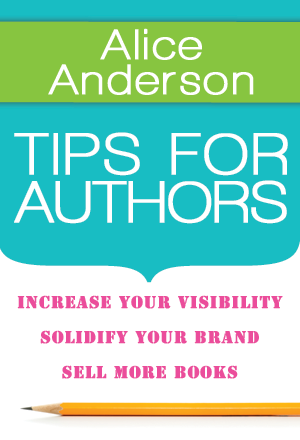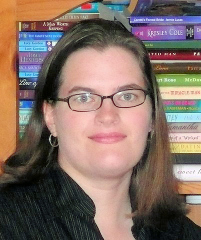We enjoy any opportunity to gather writing and publishing tips from experts in the publishing arena and Alice Anderson is one savvy author to pay attention to. For the last several years, Alice has worked with authors to promote and market their books and her website for writers has been named one of the Top 101 Websites for Writers by Writer’s Digest twice.
Alice’s new book Tips for Authors is a must-read chocked full of gems that every author will find valuable, which we discuss in today’s interview. We definitely recommend you grab a copy!
1. Your book Tips for Authors says that authors need more than a great book. What do you mean by this?
Have you heard the saying if a tree falls in the woods and no one is there to hear it, does it make a sound? That’s how I think of books in the 21st century. Some estimate that there are 3 million books available right now to consumers. Consider how many advertisements you see every day. TV commercials, product placement within shows and movies, ads in magazines, on billboards, in store advertisements, coupons in the paper, ads in the paper, those annoying little signs that clutter up the side of the road. Don’t forget radio and of course, online advertising.
How many ads do you suppose you see every day telling you how great their product is? Several hundred would be a conservative estimate.
Now think of all the things in your life that take up your time. Facebook, Twitter, email, text messaging, smart phones, tablets, tv, children’s extra curricular activities. We have more things to do and see each day than ever before. Meaning we have less downtime, less time to devote to reading.
Let’s say you’ve written a great book. A truly great book. Guess what? A great book is no longer enough to get it in front of a wide audience. First you have to make it through the slush pile at a literary agency or a publishing house. Then you’ve got to make the cut with editorial and sales. Being chosen for publication is harder than ever before due to a strained economy and lackluster sell through rates. You may have heard that the midlist (the majority of authors) is dying and it’s true.
Or, say you decide to go the self publishing route. You’ll need a fabulous editor, a terrific cover artist, a solid marketing plan and plenty of time, money and energy to promote your book once you’ve made it available through all the various distribution channels.
When I say you need more than a great book I simply mean that publishing is a business. A multifaceted, rapidly changing business. With so much competition from other authors, other books, and other things that take up a persons time and money I think it’s important to understand the facets of the business and realize that writing a great book is just the jumping off point if you want to get it published and make a living.
2. You mention the importance of authors treating publishing as a business and we absolutely agree. What are your tips for authors in the early stages of making their decision to publish?
In the first chapter of my book I talk about studying your idols and determining where you’re at in your career before deciding where you want to go. I think it’s important, no matter what industry or career, to see what’s been done before. See how people got to the top.
Being an author, to me, is sort of like having multiple personalities. As a fiction author, I’m a creative type. I love color and whimsy and words and pretty covers. But the business side is equally important. Understanding promotion, royalties, contracts, publication, distribution makes for a stronger businessperson.
It’s all about educating yourself. Learning the terms of the business. All the facets such as genre, distribution, publishers. There is so much information available these days. Resources like my book are an affordable option to almost anyone. There are literally hundreds of writing blogs where you can read articles to learn more and then ask questions in the comments. Don’t forget message boards, podcasts and online workshops.
Take the time to understand how the business works and you’ll be able to make better choices in the future.
If you’d like to see what goes into printing a book, check out this YouTube video on the printing process for Dan Brown’s The Lost Symbol.
3. In your experience, what are key mistakes novice authors make?
They spend more time online than they do writing. At one point or another I think most every writer these days makes this mistake. I made it for many years. There is no substitute for sitting your fanny in the chair and cranking out the pages. I know that sounds harsh, crass, and unartistic. But the truth of the matter is that all of your practice will make you a better writer. Stringing word after word together will teach you how to do it, then you must learn how to do it better. There’s something incredibly rewarding about finishing a novel or a writing project. If you spend more time online than you do writing you’re missing an important aspect of the business.
Being an author is about writing. I know this feels contradictory to my answer to question one, but it’s true. Many new writers get wrapped up in the community that the internet provides. It’s fun to talk to other writers, especially since they understand that the voices in your head don’t make you crazy. But you should never let yourself spend more time doing the “other stuff” than you do practicing your craft and completing your projects.
It doesn’t matter how big of a twitter following you have. If you don’t have a book to sell them, it’s a moot point.
The other problem I’ve seen during my time marketing books is books being published before they’re ready. There’s no substitute for time or thorough editing. Everyone makes mistakes and no book will ever be perfect simply because everyone’s idea of what perfection is, is different. But all too often I see books that are incomplete, poorly constructed, or full of typos. A little more time, thought, and effort would help these books. Or any book, for that matter. (Don’t throw rotten cabbages at me. I fully understand how frustrating it can be to read the same novel sixteen times. Heck, I’ve rewritten the same book four times and it’s still not ready for prime time.)
4. Tips for Authors truly does empower your audience with so many gems for building and growing an author platform. Do you have a favorite tool either online or in the book world that you’ve found useful in your own journey?
Gosh, that’s a tough question. I honestly began building my platform well over ten years ago, before blogs existed in the way they do now. I developed a network of sites for readers and writers back before everyone had a blog full of reviews. All of that aside, I’m pretty partial to message boards. I just like the way they’re organized (makes my brain happy.) We’ve retired our message board at the CataNetwork so these days I visit SavvyAuthors.com, AbsoluteWrite, and RomanticTimes.
5. Wise, Ink readers are primarily indie authors and as you know the indie publishing movement continues to expand and evolve. How do you see the future of indie publishing impacting the industry as a whole?
I think technology is changing the way the whole world does business. Consumers are more well informed than ever before in history. Places like Amazon, BarnesandNoble and Smashwords are changing the way readers get access to books. I see growth there. (Even my dad is contemplating getting a Kindle!)
Readers are more connected than ever via blogs, social networks and even book distributors. Individual voices are louder than they’ve ever been. Reviews are more important. All of this means that consumers have the power to make informed decisions. And now, thanks to affordable ebook readers, they have access to more books than they could read in a lifetime.
All of that, in my opinion, adds up to a game changing future. From an authors perspective though many things have changed, many have not. We still have a duty to produce incredible, thorough, well researched, organized, and well presented content. That will never change. We’re lucky that in the future we have more options. The internet makes connecting with readers easier. I’m not sure large corporations understand how to utilize that power. Well informed authors will learn that skill, develop it, and be successful.
Alice Anderson writes novels when she’s not creating book covers or writing articles for authors. She lives in the Southeast and co-owns a web development and marketing firm with her husband. Their Golden Retriever provides company security. For more articles and a copy of her free ebook, 55 Tips for Authors, visit her website at http://www.alice-anderson.com


